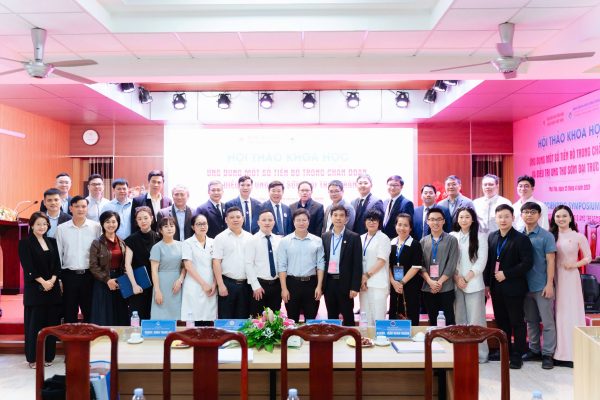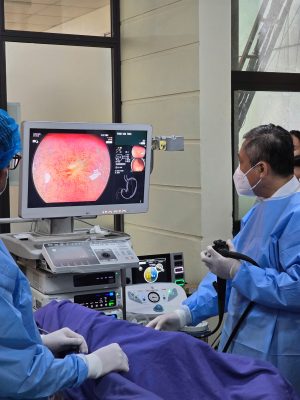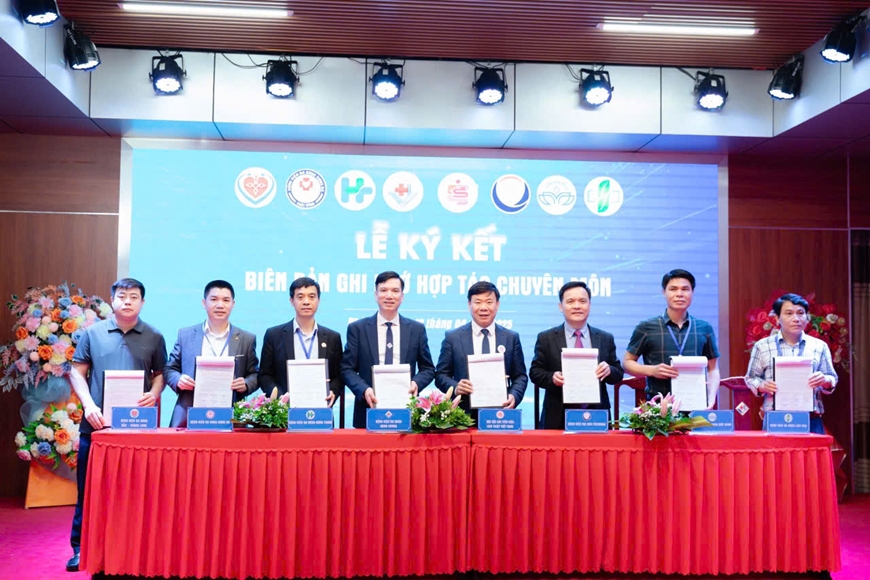On April 12, 2025, in Phu Tho province, the Vietnam Interventional Gastrointestinal Endoscopy Society (VIGES) in collaboration with Hung Vuong General Hospital successfully organized the Scientific Workshop "Application of some advances in diagnosis and treatment of early colorectal cancer", attracting more than 500 delegates from all over the country to attend.
I. OVERVIEW OF THE CONFERENCE
The workshop was held to update the latest advances in the field of diagnosis and treatment of colorectal cancer, and to improve the capacity of medical staff at medical facilities nationwide. The event took place with two main sessions: an academic discussion session in the morning and a practical “hands-on” session in the afternoon.
Speaking at the opening of the workshop, Associate Professor, Dr. Nguyen Cong Long - Chairman of VIGES emphasized: "Colorectal cancer is becoming one of the serious health threats in Vietnam. However, if detected early through screening methods such as colonoscopy or fecal occult blood testing, patients have the opportunity to be successfully treated, ensuring quality of life, as well as reducing medical costs."
Mr. Dang Thanh Hai - Director of Hung Vuong General Hospital shared: "The cooperation between Hung Vuong General Hospital and VIGES in organizing this workshop demonstrates the determination to improve the quality of medical services, especially in the field of digestion, bringing practical benefits to people in the region and the whole country."

II. HIGHLIGHTS OF SCIENTIFIC REPORTS 1. The role of new endoscopic technologies in early colorectal cancer screening
Dr. Le Quang Nhan - Vice President of VIGES, Head of Endoscopy Department, University of Medicine and Pharmacy Hospital, Ho Chi Minh City presented a report on current advanced endoscopic technologies. The report introduced in detail the technology of magnifying endoscopy, Blue Light Imaging (BLI) and Linked Color Imaging (LCI). These technologies significantly improve the ability to detect early cancer lesions in the colon and rectum, especially flat lesions that are difficult to detect by conventional endoscopy.
“BLI and LCI light technology helps enhance the contrast between blood vessels and mucosa, thereby highlighting early-stage cancer lesions, helping doctors detect and diagnose more accurately,” Dr. Nhan emphasized.
2. The value of FIT-test in colorectal cancer screening in the community
Dr. Pham Binh Nguyen - Vice President of VIGES, doctor of the Center for Hepatobiliary Gastroenterology, Bach Mai Hospital presented on the role of fecal occult blood testing (FIT-test) in colorectal cancer screening in the community. This is a non-invasive, simple, low-cost screening method that can be widely deployed in the community.
The report shows that the FIT-test has relatively high sensitivity and specificity in detecting precancerous lesions and early colorectal cancer. Widespread implementation of this test in the community can contribute to reducing colorectal cancer mortality through early detection and treatment.
3. Endoscopic treatment of upper gastrointestinal bleeding not due to portal hypertension
Dr. Ha Van Tuoc from Hung Vuong General Hospital shared his practical experience in endoscopic treatment of upper gastrointestinal bleeding not due to portal hypertension. The report provided information on the causes, clinical symptoms, diagnostic methods and especially interventional endoscopic treatment techniques.
Through studying cases at Hung Vuong General Hospital, Dr. Tuoc pointed out the high effectiveness of interventional endoscopic techniques such as hemostatic injection, hemostatic clip and bipolar electrocautery in treating gastrointestinal bleeding, helping to reduce the rate of rebleeding and death.
4. Prepare the patient for colonoscopy
Bachelor of Nursing Le Phu Son from Ho Chi Minh City University of Medicine and Pharmacy Hospital presented on the importance of colon preparation before endoscopy. The report provided detailed instructions on diet, laxative use, and important notes to ensure optimal colon cleansing, thereby improving the quality of endoscopy and polyp detection rate.
“A well-prepared colon is a key factor in determining the quality of an endoscopy, helping to increase the rate of lesion detection and reduce the risk of missing something,” Bachelor Son emphasized.
III. CLINICAL PRACTICE SESSION
The highlight of the workshop was the clinical practice session, where Dr. Le Quang Nhan and Dr. Nguyen The Phuong directly performed gastrointestinal endoscopy using modern technologies (LCI, BLI, magnifying endoscopy) to diagnose early colon cancer lesions and colon polyp removal techniques with instruments such as: Clutch Cutter, Snare, Biopsy Forceps.

IV. PROFESSIONAL COOPERATION
Within the framework of the workshop, VIGES signed a cooperation agreement to provide professional support with a number of hospitals: Hung Vuong General Hospital, Phenikaa University Hospital, Bac - Thang Long General Hospital, Hung Ha General Hospital, Hung Thinh General Hospital, Duc Minh General Hospital. This is an important step in improving the capacity to diagnose and treat colorectal cancer at medical facilities, contributing to improving the quality of medical services for the people.

Associate Professor, Dr. Nguyen Cong Long said: “Up to now, VIGES has gathered more than 1,000 members who are doctors and nurses from major hospitals, private hospitals, and clinics nationwide and abroad. The Association has been carrying out the mission of improving the quality of diagnosis and treatment of digestive diseases in Vietnam.”
V. CHALLENGES AND SOLUTIONS
Colorectal cancer is showing a tendency to “rejuvenate” in Vietnam, with the main cause being an unhealthy lifestyle such as eating a lot of red meat, processed foods, few green vegetables, smoking, drinking alcohol and being sedentary. According to statistics in 2022, the country recorded nearly 17,000 new cases and more than 8,450 deaths, ranking 4th in incidence and 5th in mortality among common cancers.
To address this challenge, the workshop proposed a number of solutions:
- Strengthen propaganda about healthy lifestyle and risk factors for colorectal cancer.
- Develop a colorectal cancer screening program that combines both FIT-test and colonoscopy.
- Invest in modern equipment and train high-quality human resources in the field of digestive endoscopy.
- Strengthen international cooperation and transfer of advanced technology in diagnosis and treatment of colorectal cancer.
VI. CONCLUSION
The scientific workshop “Application of some advances in the diagnosis and treatment of early colorectal cancer” was a great success, bringing many practical values to the medical community and the people. This is a testament to VIGES’s continuous efforts in improving the quality of diagnosis and treatment of digestive diseases in Vietnam.
VIGES would like to sincerely thank Hung Vuong General Hospital, sponsors, speakers and all delegates who have accompanied the workshop. We are committed to continuing our efforts in improving the quality of diagnosis and treatment of digestive diseases, contributing to protecting the health of Vietnamese people.

